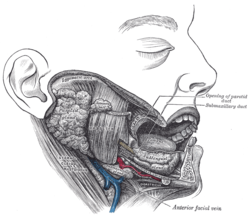Facial vein
| Facial vein | |
|---|---|
 Veins of the head and neck. (Anterior facial labeled at right center, at cheek, to right of masseter.) | |
 Dissection, showing salivary glands of right side. (Anterior facial vein labeled at bottom right.) | |
| Details | |
| Source | angular vein |
| Drains to | internal jugular vein |
| Artery | facial artery |
| Identifiers | |
| Latin | vena facialis anterior |
| TA98 | A12.3.05.018 |
| TA2 | 4817 |
| FMA | 50874 |
| Anatomical terminology | |
The anterior facial vein (facial vein) commences at the side of the root of the nose and is a direct continuation of the angular vein where it also receives a small nasal branch. It lies behind the facial artery and follows a less tortuous course. It receives blood from the external palatine vein before it either joins the anterior branch of the retromandibular vein to form the common facial vein, or drains directly into the internal jugular vein.
Path
From its origin it runs obliquely downward and backward, beneath the Zygomaticus[disambiguation needed] and zygomatic head of the Quadratus labii superioris, descends along the anterior border and then on the superficial surface of the Masseter, crosses over the body of the mandible, and passes obliquely backward, beneath the Platysma and cervical fascia, superficial to the submandibular gland, the Digastricus and Stylohyoideus.
The facial vein has no valves, and its walls are not so flaccid as most superficial veins.
Additional images
-
Bloodvessels of the eyelids, front view.
-
Lateral head anatomy detail
-
Head anatomy anterior view
External links
- Template:EMedicineDictionary
- lesson4 at The Anatomy Lesson by Wesley Norman (Georgetown University) (parotid2)
- http://www.dartmouth.edu/~humananatomy/figures/chapter_47/47-5.HTM
![]() This article incorporates text in the public domain from page 645 of the 20th edition of Gray's Anatomy (1918)
This article incorporates text in the public domain from page 645 of the 20th edition of Gray's Anatomy (1918)



